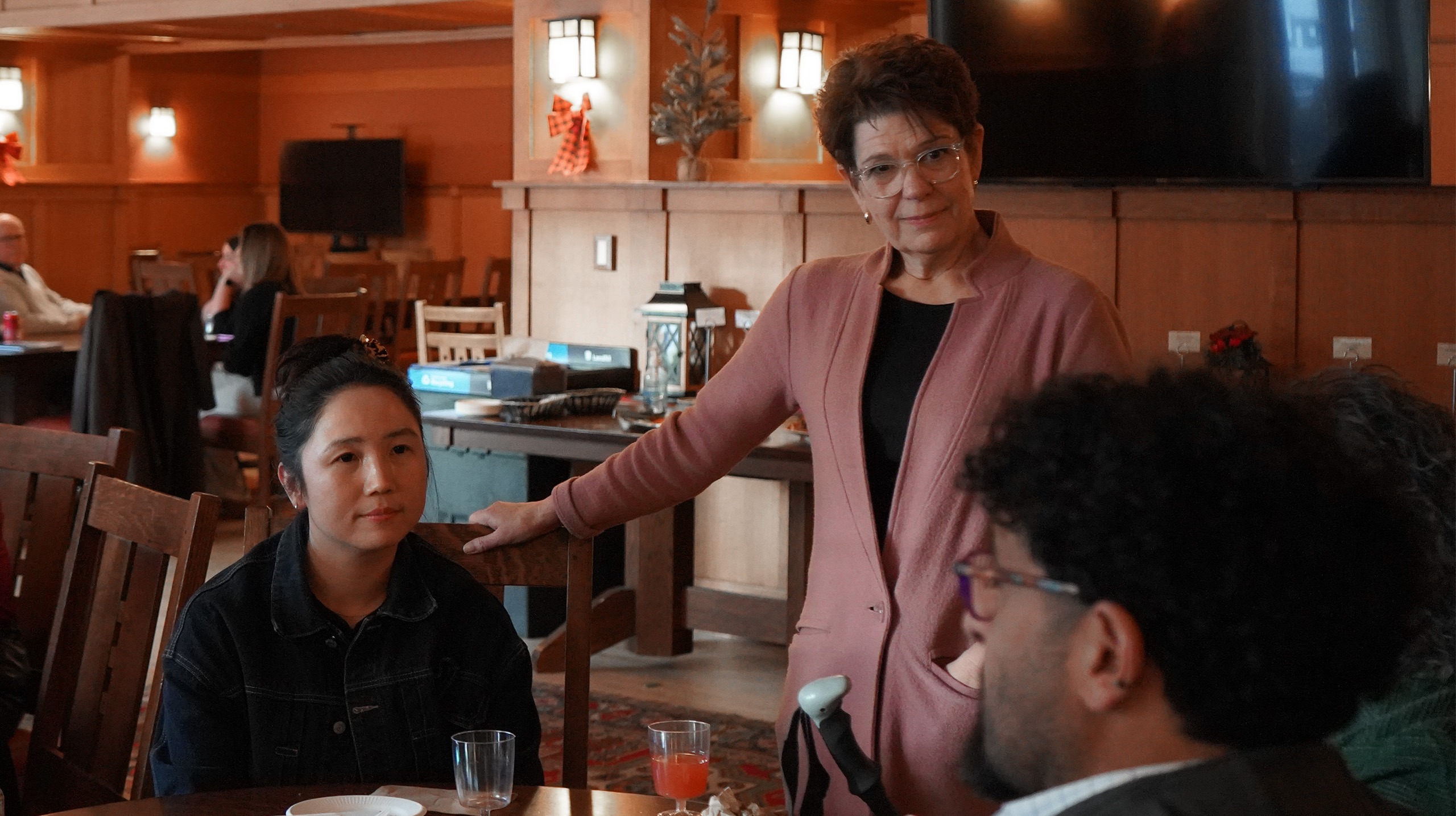Are you looking for some fantastic free resources to support your continuous learning and development as a quality improvement leader? You have come to the right place! QI Power Hour is HQC’s monthly quality improvement webinar series focused on helping you to 1) build your quality improvement (QI) knowledge, and 2) inspire change in Saskatchewan and beyond.
We had another record year for interest and attendance to our sessions (thanks to our awesome presenters and participants) and sign ups to our QI Power Hour newsletter. Based on the past year’s success and to aid you on your pursuit of learning, we wanted to highlight some of our most popular sessions that are essential to three core skills of an Improvement Leader:
- Leading conversations
- Leading large-scale change
- Using data for research, improvement, and accountability
Let’s dive in!
Here are the Top 5 QI Power Hour Sessions from 2019
- Bravely leading challenging conversations
- Leading change and improvement in a world that is changing fast
- Going big with community-based improvement, a B.C. approach
- Health Networks in Saskatchewan
- Getting on the same page: the difference between data for improvement, data for research, and data for accountability
Core Skill: Leading Conversations
Why is the ability to lead conversations a core QI skill?
Changes and improvements start with conversations, and while these conversations aren’t always easy, they are necessary to promote shared understanding and engage stakeholders and partners. This session is a great starting point or refresher for Improvement Leaders having important conversations around implementing change.
1. Bravely leading challenging conversations
Speakers
- Stephani Roy McCallum, CPF, Chief Storm Rider at the Courageous Leadership Project
Session description
Change is hard. Even when it brings something better, adapting to and working with change can feel scary, uncertain, and uncomfortable. The foundation of making any change initiative work in the long-term is our ability to talk through the issues, concerns, emotions, and possibilities – together. When we have brave, honest conversations we find solutions to the problems we face – together. The challenge is that no one is born knowing how to have these kinds of conversations, and it takes brave leadership to create the space to talk together in new ways.
In this session, Stephani explores how to have brave, honest conversations with others and provides some tips and tools for embracing emotion and creating space for constructive conversations in order to find solutions. How do you want to show up as a leader? What leadership strengths will serve you best? Finding the answers to these questions will help you authentically lead tough conversations on important issues.
Recommended resources:
Core Skill: Leading Large-scale Change
Why is leading large-scale change a core QI skill?
Conversations are a great starting point for implementing change, but they need follow through. Point improvements are important testing grounds for new ideas and concepts, but in order to achieve transformational change, we need to be able to scale and spread successful point improvements. Large-scale change refers to mobilizing large groups towards a shared vision of a future state. Of all our great sessions from 2019, three provided examples of large-scale change leadership in health and health care.
2. Leading change and improvement in a world that is changing fast
Speakers
- Helen Bevan, Chief Transformation Officer, Horizons Team, NHS England
Session description
Helen Bevan is one of our quality improvement heroes here at the Health Quality Council, and we were thrilled to have her join us for QI Power Hour to speak on how to lead change and improvement initiatives in a rapidly changing world.
How can we make improvements happen in a world that is increasingly dynamic, fast-moving, and with so many complex dilemmas? In this session, Helen Bevan explores some of the latest ideas, tools, and approaches from leading practitioners of large-scale change around the globe to help participants navigate the situations that often have no “right” answer.
She also dives into the practical implications and opportunities that arise in a world where the balance between “old power” (positional power and authority) and “new power” (networks and social movements) is shifting. As improvement leaders, we need to be able to operate in the middle of these two powers. How can we build our individual and collective power to create change and deliver results in this new world?
Recommended resources:
3. Going big with community-based improvement, a B.C. approach
Speakers
- Dr. Jennifer Mervyn, former Practice Initiative Lead for the Child and Youth Mental Health and Substance Use Collaborative
- Christina Southey, Improvement Advisor for the Collaborative, Independent Consultant
- Nikita Soares, Program Coordinator, Doctors of BC
Session description
From 2014 – 2017, British Columbia engaged in what would become the largest improvement initiative to date in the province. Engaging over 2500 participants, including over 200 youth and parents with lived experience, 64 communities embarked on improving the child and youth mental health and substance use care locally and provincially. The Shared Care Committee of BC, a joint committee of the Ministry of Health and Doctors of BC, funded and championed the initiative, and the lessons learned on how to move together at pace and at scale can be spread to other jurisdictions in Canada interested in exploring large-scale, community-driven change.
In this session, Dr. Jennifer Mervyn, Christina Southey, and Nikita Soares explore the transferable aspects of the change model, values, and approaches that proved successful within the BC Child and Youth Mental Heath and Substance Use Collaborative, as well as lessons learned for future Collaboratives to consider.
Recommended resources:
4. Health Networks in Saskatchewan
Speakers
- Dr. Kevin Wasko, Physician Executive, Integrated Rural Health
- Sheila Anderson, Executive Director, Primary Health Care Regina
- Dr. Rashaad Hansia, Physician Executive, Integrated Urban Health
Session description
Large-scale change is currently in progress in Saskatchewan in the form of blossoming health networks within the province. Health Networks are collaborative teams of health professionals, including physicians and community partners, providing fully integrated services to meet the health needs of individuals and communities. Health Networks are foundational building blocks of our Saskatchewan health system and how we continue to advance recommendations from the 2009 Patient First Review, the 2012 Primary Health Framework and the Panel Report that recommended moving to a single health authority.
In this session, Dr. Kevin Wasko, Sheila Anderson, and Dr. Rashaad Hansia talk about the experience of uncoordinated care (from a patient’s viewpoint) and dive into some possible solutions, including tailored network teams who work across the system to provide coordinated, patient-centred care.
Recommended resources:
Core Skill: Using Data for Research, Improvement, and Accountability
Why is using data for research, improvement, and accountability a core QI skill?
Measurement is an essential part of understanding how your system is performing, identifying where to target your improvement efforts, and understanding the impact of your changes. There is often confusion, however, on the types of data and measures needed for different purposes, including for improvement, research, and accountability. Check out this session to understand when and where to use what type of data!
5. Getting on the same page: the difference between data for improvement, data for research, and data for accountability
Speakers
- Jessica Hamilton, Researcher, Saskatchewan Health Quality Council
- Laura Schwartz, Researcher, Saskatchewan Health Quality Council
Session description
Have you ever worked on developing a measurement plan with your quality improvement team and experienced disagreement on the types of measures needed, how much data is needed, and how often to collect it? In this session, Jessica and Laura help to answer some common questions that arise when selecting measures, as well as understand perspectives that team members may be bringing to your measurement discussion.
How do you differentiate between data for improvement, data for research, and data for accountability? Each type of measurement is important in supporting quality improvement work, and you’ll come out of this session with a better understanding of how all three forms of measurement work together to help you understand your system as a whole.
Recommended resources:
- The Three Faces of Performance Measurement article can be accessed as a free PDF through the BC Patient Safety & Quality Council. Find it here!
- Understanding Variation: How to identify and manage variation (QI Power Hour)
What’s Next?
If these sessions and tidbits have you hungry for more, make sure to subscribe to our QI Power Hour mailing list to get updates about our upcoming sessions. We have some exciting stuff coming up in the next year, so don’t miss it!
We post all our QI Power Hour recordings on our website so you can access that knowledge and learning at any time, so if you simply can’t wait until the new year for more great learning content, make sure to check out our past QI Power Hour webinars.
Have questions or want to work with us on an upcoming QI Power Hour? Get in touch! You can contact us here with any questions or ideas you may have.




